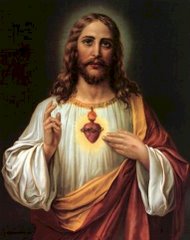
Benedict XVI spoke to Brazilian Novus Ordo Bishops on May 11, 2007 in Sao Paulo about methodical evangelization aimed at personal and communal fidelity to Christ.
The essence of his speech to the Novus Ordo Bishops was that Catholics in Brazil are losing the faith because they were never sufficiently grounded in the faith. He stated: “They are easily influenced because their faith is weak, confused, easily shaken and naive, despite their innate religiosity,"

He essentially then is blaming the decline of church attendance and the success of Protestants not on modernism, not on Vatican II, not to Lumen Gentium and the abandonment of the Holy Mass but on the Brazilian people themselves. This is like saying that the sheep are to blame for becoming lost not the Shepherd.
Remarkably, he continued by stating: Catholics should maintain good relations with Protestant sects as Catholic and Protestants have common ground with regards to moral issues.
No one is arguing that some Protestants may have family values and support other Catholic values. What is remarkable is that Benedict XVI does not give the Novus Ordo Bishops marching orders to reintroduce true Catholic doctrine and the Holy Mass back in Brazil.
Of course in order to give marching orders Benedict XVI must be able to rule in the same manner as Pope St. Pius V and Pope St. Pius X. Under the current Modern Church Constitution Lumen Gentium (not listed in Holy Scriptures) , the Novus Ordo Bishop of Rome must consult with the Bishops and the College of Cardinals to build a consensus before anything is done. This form of Church Government is called Collegiality. This type of governing of the Church was not instituted by Christ when he made Peter our first Pope.
Benedict then lamented that aggressive proselytism by sects had made ecumenical dialogue more problematic. Perhaps what Christ had in mind was a forceful Vicar of Christ that ruled his Church. Instead Benedict XVI said there was a need for deep doctrinal awareness among Catholics, so they could better know the specific identity of Christian communities, the elements that divide them and the possible areas of cooperation.
What do Catholics need to learn from Protestants?
Wouldn't be better to tell bishops to renounce modernism, declare that Protestants are heretics, promote true Catholicism, reintroduce Catholicism back into their parishes and reinstitute the Holy Mass?
The essence of his speech to the Novus Ordo Bishops was that Catholics in Brazil are losing the faith because they were never sufficiently grounded in the faith. He stated: “They are easily influenced because their faith is weak, confused, easily shaken and naive, despite their innate religiosity,"

He essentially then is blaming the decline of church attendance and the success of Protestants not on modernism, not on Vatican II, not to Lumen Gentium and the abandonment of the Holy Mass but on the Brazilian people themselves. This is like saying that the sheep are to blame for becoming lost not the Shepherd.
Remarkably, he continued by stating: Catholics should maintain good relations with Protestant sects as Catholic and Protestants have common ground with regards to moral issues.
No one is arguing that some Protestants may have family values and support other Catholic values. What is remarkable is that Benedict XVI does not give the Novus Ordo Bishops marching orders to reintroduce true Catholic doctrine and the Holy Mass back in Brazil.
Of course in order to give marching orders Benedict XVI must be able to rule in the same manner as Pope St. Pius V and Pope St. Pius X. Under the current Modern Church Constitution Lumen Gentium (not listed in Holy Scriptures) , the Novus Ordo Bishop of Rome must consult with the Bishops and the College of Cardinals to build a consensus before anything is done. This form of Church Government is called Collegiality. This type of governing of the Church was not instituted by Christ when he made Peter our first Pope.
Benedict then lamented that aggressive proselytism by sects had made ecumenical dialogue more problematic. Perhaps what Christ had in mind was a forceful Vicar of Christ that ruled his Church. Instead Benedict XVI said there was a need for deep doctrinal awareness among Catholics, so they could better know the specific identity of Christian communities, the elements that divide them and the possible areas of cooperation.
What do Catholics need to learn from Protestants?
Wouldn't be better to tell bishops to renounce modernism, declare that Protestants are heretics, promote true Catholicism, reintroduce Catholicism back into their parishes and reinstitute the Holy Mass?





No comments:
Post a Comment